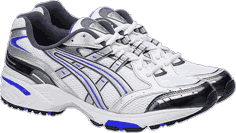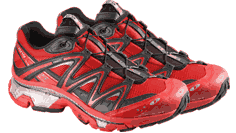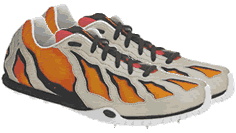CHOOSING Running ShoesAdvice on choosing good footwear for running.
Why wear specialist Running Shoes?It's essential to invest in a pair of proper running shoes if you want to run regularly. Shoes designed for runners serve two main purposes:
However, these two objectives are at odds with each other as a shoe designed for maximum protection against injury is not optimised for speed and a shoe design for maximum speed is not optimised for preventing injury. For most of us, it is not essential to squeeze every last ounce of performance out of our running shoes, particularly when training, so support and comfort are generally the priority and should be the overriding factor if you are buying a pair of multi-purpose running shoes.
What types of Running Shoes are there?We categorise running shoes into 3 broad categories :
We would advise that you start by buying yourself a good pair of general-purpose running shoes. These needn't be expensive as long as they provide good cushioing and support. As you get more serious about running and expand the type of running you do you may consider buying some off-road shoes. If you become very serious about running and want to achieve your very best competitively, then a pair of racing flats may be worth buying.
The way you run affects your choice of Running Shoes When most people run, their feet do not tend to hit the ground squarely...this action is called "pronation" and can cause injury if you run long distances on hard surfaces. Within each of the above categories, particularly road and off-road shoes, there will be a range of choices based on the way you run (your biomechanics). When most people run, their feet do not tend to hit the ground squarely, they usually impact on one side of the heel and then roll forward diagonally. This action is called "pronation" and can cause injury if you run long distances on hard surfaces. To compensate for this, shoes can be designed with extra support to help reduce the rolling motion and encourage a better running action. Shoes fall into 3 catogories depending on the type of pronation: a) Motion Control Shoes - for over-pronation (most runners) b) Cushioned/Neutral Shoes - for under-pronation c) Stability Shoes - for neutral pronation A specialist running shop will usually be able to test your biomechanics and advise on what type of pronation support you need using equipment designed to assess your running gait. However, you can get a guide yourself by performing the following test.
Choosing the right size Running Shoes for youYour feet will tend to swell after running a few miles so bear this in mind when you try them on. To help with this try on the shoes in the afternoon or evening as you feet will normally swell during the day. The shoes should fit snugly at the heel but there should be a thumb's width between your big toe and the end of the shoe. Some shoes will come in different width fittings so ask about this if necessary. You weight will also have a bearing on the shoe - heavier people will need shoes with greater support to provide more protection against impact.
How often should I replace my Running ShoesThe generally accepted consensus is that road and trail running shoes should be replaced after 300-500 miles of running. To ensure that your running shoes continue to be effective at preventing injuries and helping you achieve a good grip, you should replace your shoes once they have been well used. You can use the Good Run Guide Shoe Tracker to keep track of the number of miles you have run in each pair of shoes. The generally accepted consensus is that road and trail running shoes should be replaced after 300-500 miles of running, depending predominantly on your body weight, running style and the surface you are running on. Racing Flats will not last as long due to their reduced durability, and will typically need to be replaced after 125-250 miles of use. Bear in mind that heavier runners and runners who strike the ground harder than average will tend to get less miles from their shoes. If you start to experience regular knee or shin pain this may be an indication that you need to replace your running shoes more often. If you run a lot of miles it can be a good idea to have 2 pairs of shoes and to rotate them so that each pair is 'rested' for longer between uses, allowing them time to fully dry out.
Choosing your shoesWe would strongly advise buying your running shoes from a specialist running shop, which can offer expert advice on the right shoe for you. If you want to do some of your own research beforehand, we would recommend that you take a look at www.shoeguide.co.uk. Its a great website that offers independent expert reviews and detailed information on hundreds of running shoes.
|
||||||||||||||||||||||||||||||

 These shoes tend to have a shallow tread that wears well and also a lot support and cushioning to absorb the impact of long distances run on hard, unforgiving surfaces; when you run, the impact of your feet on the ground is equivalent to approximately 3 times your body weight so this is important to enable you to train safely.
These shoes tend to have a shallow tread that wears well and also a lot support and cushioning to absorb the impact of long distances run on hard, unforgiving surfaces; when you run, the impact of your feet on the ground is equivalent to approximately 3 times your body weight so this is important to enable you to train safely.  These shoes have a deeper tread to provide better traction on softer, often uneven or slippery, surfaces. They tend to have more durable uppers than road shoes due to the type of terrain they are designed for and varying levels of support.
These shoes have a deeper tread to provide better traction on softer, often uneven or slippery, surfaces. They tend to have more durable uppers than road shoes due to the type of terrain they are designed for and varying levels of support.  These shoes have a much lower heel (hence the name). As a consequence they are lighter and more efficient than other shoes. However, it also means that they provide less support and cushioning so should not be used for general training. Racing Flats tend to be raised at the front (tapered) to encourage running on the toes to increase speed, and some have metal spikes on the taper to provide increased grip. These types of running shoes tend to be used on running tracks or long distance races by very fast runners where the weight of the shoe can sometimes produce a competitive speed benefit.
These shoes have a much lower heel (hence the name). As a consequence they are lighter and more efficient than other shoes. However, it also means that they provide less support and cushioning so should not be used for general training. Racing Flats tend to be raised at the front (tapered) to encourage running on the toes to increase speed, and some have metal spikes on the taper to provide increased grip. These types of running shoes tend to be used on running tracks or long distance races by very fast runners where the weight of the shoe can sometimes produce a competitive speed benefit.  Good Run Guide - The UK's Leading Independent Running Website
Good Run Guide - The UK's Leading Independent Running Website